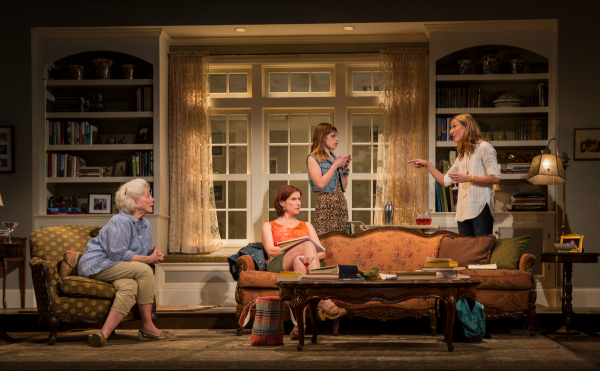
(© Liz Lauren)
You know you're in trouble when the set is the most innovative, interesting element of a play. And so it is in Gina Gionfriddo's Pulitzer Prize finalist Rapture, Blister, Burn, a pseudo-drama, now playing at the Goodman Theatre, that's actually a series of contrived debates on the age-old question over whether today's women can actually have it all.
The curtain rises on the modest backyard of Gwen Harper (Karen Janes Woditsch) and her husband, Don Harper (Mark L. Montgomery). They're having a reunion of sorts with Catherine (Jennifer Coombs), who was Don's significant other and Gwen's roommate in grad school. Their collegiate domesticity was torn asunder after Catherine went to London for a year. Don stayed home and married Gwen.
Flash forward a decade or so: Gwen is a stay-at-home mom, unhappily married to Don, and caring for their two young sons, ages 13 and 3. Catherine, meanwhile, is off in New York City, living the dream. She's the author of books delving into the connection between reality TV and the collective loss of national privacy, torture porn as a reaction to second-wave feminism, and the rise of degradation as entertainment in the wake of 9/11. Catherine is also a stop-and–stare babe, gifted with a towering intellect and a professional drive that has landed her at the pinnacle of her field.
The impetus for the reunion was sparked when Catherine's mother, Alice (Mary Ann Thebus) has a heart attack, an event that has the childless, husbandless Catherine deeply troubled over the prospect of being left alone in the world. A drunken phone call from Catherine to Gwen has brought everyone together, and opened up within each woman a dissatisfied suspicion that other got the better end of the deal. Don, meanwhile, lopes along in a state of marijuana- and alcohol-induced numbness, deeply reluctant to peel away the security of booze and pot, lest he have to look at his own missed opportunities.
Matters go from completely predictable to eye-rollingly unbelievable in short order. Once Don and Catherine put down their beers long enough to get physical, they come up with the preposterous plan of having Gwen take on Catherine's life by moving to New York, taking her older, theater-inclined son Julian with her. Catherine and Don will move into Alice's house, as will Don and Gwen's three-year-old son. Everyone will get what they want, right? Catherine has a ready-made family, Gwen a shot at the independent life she gave up when she dropped out of school to marry Don. And Don gets…Well, Don gets to ditch his nagging wife and make out with the object of his fantasies for the past decade or so.
Directed by Kimberly Senior, the performances are provocative even as Gionfriddo's plot becomes more and more improbable. Montgomery is a charismatic lug, even when you want to throttle him into behaving like an adult. Woditsch plays Gwen just high-strung enough to imply a complete meltdown is never far away, pitching her voice like a violin string ready to snap at the slightest onset of friction. Coombs' Catherine brings a sense of authority to her academic spoutings, but it's tough to believe she's actually in demand as a provocative academic speaker – there's nothing she utters that hasn't already been said hundreds of time before. Her ostensible love for Don feels unrealistic, as Catherine changes overnight from a driven, goal-oriented career gal to somebody who wants nothing more than to stay up all night drinking beer and watching old movies. It's as if she's been a victim of the body snatchers.
The entire show feels like an undergrad exercise in debating feminism, with each debater carefully selected to represent a particular demographic group and age range. Avery (played by Cassidy Slaughter-Mason), one of Catherine's students, provides the twentysomething perspective, Gwen the view of a housewife and stay-at-home-mom, Catherine, that of a husband/childless career woman, and even the elderly Alice. All of the women have that one single moment where they question the way they live their life, whether by choice or circumstance.
The real star of the show is set designer Jack Magaw's intricate, sliding rooms-within-rooms. Gwen and Don's backyard morphs into Alice's well-appointed living room with the ease of a nesting doll. Backdrops of towering trees and neighborhood houses glide into place with each scene change, making for a nice, neat, and realistic counterpoint to the story playing out onstage.
Sadly, Rapture, Blister, Burn needs more than an amazing set to keep it on track. While presenting retro-feminist theory as revelatory and a love that doesn't seem emotionally or physically believable might have you blister and burn, it certainly doesn't provide feelings of rapture.










